CARACAS – Venezuela’s establishment “opposition” has closed ranks around 14 candidates for its upcoming October 22 primary.
Whoever wins in October will get to run against socialist dictator Nicolás Maduro next year in an election that — let’s be real — will be nowhere close to free and fair.
The Maduro regime has already begun to throw wrenches left and right into the whole process. I can’t help but think that I’ve seen this movie before – Maduro is prolific at staging sham elections – as the socialist regime begins to ban candidates from running in 2024 before even setting a fixed date for the election.
A poll released in the middle of June by the agency Poder y Estrategia showed a marked surge in support for former lawmaker María Corina Machado over the rest of the candidates. About 57 percent of respondents expressed their intention to vote for her in the upcoming primaries.
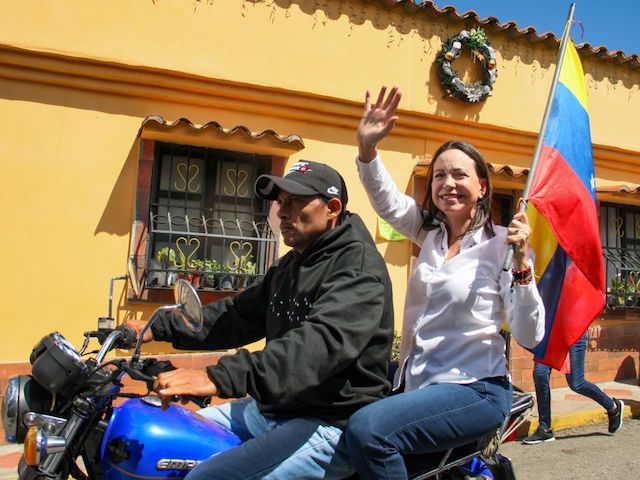
Maria Corina Machado on a motorcycle as she waves a flag during her campaign rally in western Táchira, Venezuela. (Jorge Castellanos/SOPA Images/LightRocket via Getty Images)
According to the poll, Machado, who leads the country’s only mainstream center-right party Vente Venezuela, has a 37-point lead over comedian Benjamín Rausseo, who announced his separation from the “opposition” primary process and will run as an independent — just as he did in 2006.
That poll contrasts with the one released by polling firm Meganálisis in May, which showed that “nobody” was leading the primary race. Personally, I see her rise as justified, as every other candidate on the list is either a repeat of a repeat, or simply does not have significant support.
If you think that the latest poll means that Machado — who has expressed that the main enemy of Venezuela is socialism — has a clear path to becoming Maduro’s rival next year, then think again, because the Maduro regime banned her from running in next year’s election before I could even finish writing this article.
Why and how she was banned from politics for a period of 15 years should not come as a surprise to anyone that knows how any socialist regime behaves.
Luis Ratti, an “independent” presidential candidate with ties to the socialist regime, requested to Venezuela’s pro-Maduro Comptroller General that Machado, along with some other candidates, be banned from running for office. Ratti based his request to ban Machado on her call for international sanctions against the Maduro regime, a serious human rights violator and alleged state sponsor of drug trafficking.
Ratti was among Maduro’s hand-picked rivals for the sham 2018 presidential election that Maduro rigged down to the last detail to cling to power. He resigned days before the election.
The announcement of Machado’s 15-year ban was carried out by chavista lawmaker José Brito, a man who was expelled from the Justice First party in 2019 for aiding the Maduro regime.
Brito read the announcement of her ban outside the Comptroller General’s office on June 30.
#AHORA | Brito asegura que su acción es en beneficio de quienes quieren un cambio político en el país #26jun – vía @jesusabreu88 https://t.co/OIOOyz3QWJ pic.twitter.com/j0q0SMmwaV
— El Pitazo (@ElPitazoTV) June 26, 2023
The ban does not begin this year – it was “retroactively” applied in what appears to be a clear lack of due process, beginning in 2015 and ending in 2030. Machado’s situation was rather complicated due to a clear deliberate omission of the socialist regime.
The Maduro regime initially banned Machado from holding any public office for a year in 2015. Henry Alviarez, Machado’s lawyer, explained to the Venezuelan news outlet El Pitazo in June that, while the one-year ban has long since expired, the Comptroller General’s office was yet to issue the corresponding clearance with the National Electoral Council (CNE).
Without it, Alvairez continued, CNE’s automated systems will not allow Machado to register her candidacy for president even if she wins the primary, making a possible Machado victory in the primary moot even before this new ban.
¡A Maduro es al que vamos a inhabilitar en 2024!
Mensaje de @HenryAlviarez desde Barinas. #BarinasConMaríaCorina pic.twitter.com/K66HxqFHa8
— Vente Venezuela (@VenteVenezuela) June 30, 2023
Machado responded by describing her ban as “useless” and “proof” that the socialist regime is defeated.
Una INÚTIL “inhabilitación” que sólo demuestra que el régimen sabe que YA está DERROTADO.
Ahora votaremos con más fuerza, más rebeldía y más ganas en las Primarias.
Aquí quién HABILITA es el pueblo de Venezuela.
Hasta el final es HASTA EL FINAL! pic.twitter.com/wRof639noG
— María Corina Machado (@MariaCorinaYA) June 30, 2023
Since the 15-year ban “begins” in 2015, Machado cannot run in the 2024 election and must wait until 2030 to appear on the ballot — just like what Brazil is doing to former President Jair Bolsonaro.
For Venezuelans, there are zero surprises left in the list of candidates. Personally, as someone who has lived through the entirety of this socialist revolution and is burnt out from seeing the same faces in fake elections since 1999, no candidate out there is making me think, “yes, this is the one for sure.”
Some of the remaining candidates include:
- Andrés Velásquez of the left-wing Radical Cause party, a man that has unsuccessfully run for president many times in the past — even doing so before I was even born in 1988.
- Henrique Capriles Radonski, a politician who lost to Hugo Chávez in 2012 and Nicolás Maduro in 2013. Even if he wins the primary, he’s still banned from running until 2032.
- Freddy Superlano of the Popular Will party (a member of the Socialist International). Superlano is the party’s replacement for Juan Guaidó, the country’s former legitimate interim president between 2019 and 2022 who was banished from Colombia to Miami in April. In 2019, Superlano himself was embroiled in a corruption scandal that erupted within the now-extinct interim government established to oust Maduro between 2019-2022.
The rest of the candidates are lesser-known ones, but not a single new name in the list.
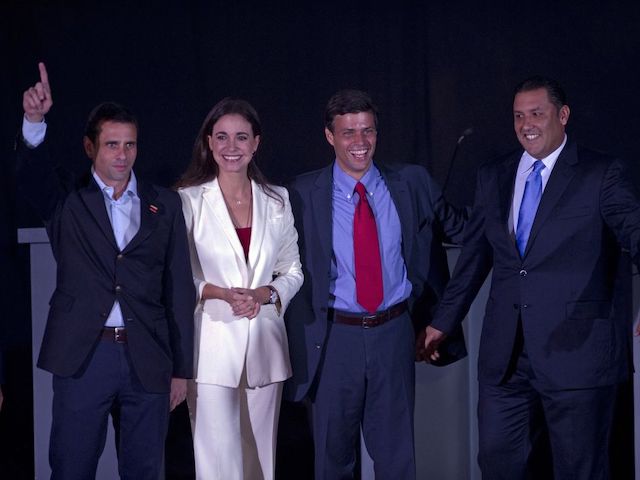
Henrique Capriles Radonski, María Corina Machado, the now-exiled socialist opposition leader Leopoldo López, and Pablo Perez (left to right) at an opposition presidential primary debate in 2011. (JUAN BARRETO/AFP via Getty Images)
I would not hesitate to cast a vote against Maduro if there was an actual free and fair election featuring genuine opposition candidates, and not ones puppeteered by the socialist regime, as was the case in the 2018 sham presidential election. Even if it were free and fair though, I’m not sure I trust myself to know – I’ve spent two thirds of my life living under socialist revolution and as such have never participated in a real election.
Banning is not the only thing the Maduro regime does to candidates who dare offer legitimate alternatives. Many candidates, including Machado, have denounced constant harassment, intimidation, and persecution by Maduro’s SEBIN intelligence service. For Machado, the intimidation tactics and, often, physical attacks are not new.
Machado was violently attacked by pro-Maduro gangs in 2018 during an anti-socialism rally led by her party.
3/8 Los violentos utilizaron piedras, palos, tubos, navajas y otros objetos contundentes contra quienes caminaban pacíficamente en Upata. Fueron directamente contra @MariaCorinaYA. pic.twitter.com/lR3NA5p0HO
— Comando María Corina (@PrensaMCM) October 25, 2018
Similarly, in 2014 – after she was expelled from the National Assembly – Machado, who planned to defy the orders that removed her from her elected position, was tear-gassed by Maduro’s armed forces.
Machado, recién lanzado el primer gas lacrimógeno. pic.twitter.com/ksxbo9EljN
— Daniel Pardo (@pardodaniel) April 1, 2014
She was also attacked and had her nose broken in 2013 while inside the premises of the National Assembly.
Nominally, the “opposition” primary has no direct Maduro involvement. Yet the actual voting process organized by the “opposition” leadership has its own competence issues. Those leaders have emphasized finding ways for Venezuelans abroad to be able to vote, as more than 7 million — almost a quarter of Venezuela’s entire 30 million population — have fled socialism in the past decade. They insisted on doing so without the support and infrastructure of the pro-Maduro National Electoral Council (CNE). While this, in theory, prevents the Maduro regime from knowing who participates and thus gives a sense of security and privacy to voters, it also means that the process needs to be run without an “impartial” organization that, should things work the way they are supposed to, is meant to provide structure to electoral processes.
The “opposition” primary committee estimates that 5 of the 7 million Venezuelan refugees are eligible to vote, but only 3 million will be able to participate in the October primary election, due to a mixture of both logistical limitations regarding voter verification and limitations inherent to organizing primaries abroad.
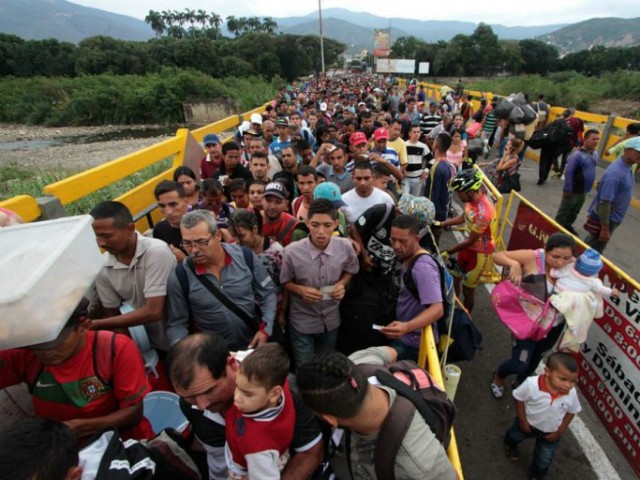
Venezuelan citizens cross the Simon Bolivar international bridge from San Antonio del Tachira in Venezuela to Norte de Santander province of Colombia on February 10, 2018. (GEORGE CASTELLANOS/AFP/Getty Images)
This will leave a sizable portion of Venezuelans disenfranchised — but, according to the primary committee, is preferable than the alternative of relying on Venezuela’s National Electoral Center. The CNE claims only 107,904 Venezuelans abroad are eligible to vote.
Even if the opposition pulls off a CNE-free primary, the general election will fall under CNE purview, and thus potentially millions of voters abroad will be left out.
The current members of the top electoral authority coordinated a “surprise” resignation in June, which automatically prompted the regime-controlled National Assembly to establlish a handpicked committee to designate new members. This “renewal” of our top electoral authority is not aimed at making things fairer. Why would you make it easier for 5 million (out of the total 21.1 million) voters that fled your regime to be able to vote against you?
Machado proposed a third, rather bewildering, solution to this dilemma.
In an interview with Colombian newspaper El Tiempo on June 26, Machado said that if she won the primary election, she would reach out to Colombia’s radical leftist President Gustavo Petro and ask him to intevene with Maduro to convince him to allow Venezuelans abroad to vote in the general election.
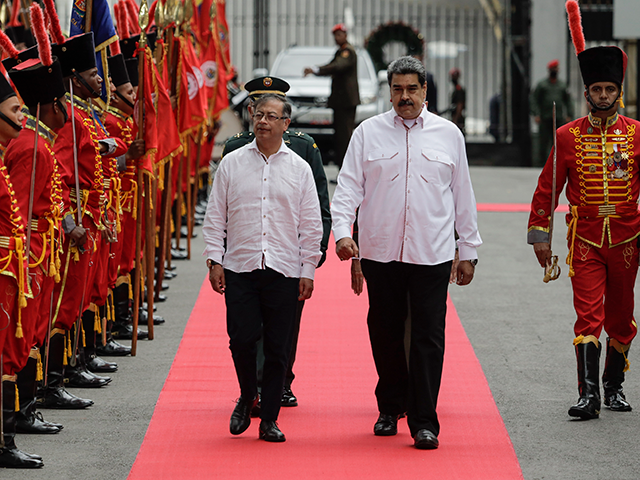
Colombia’s President Gustavo Petro, left center, and Venezuelan President Nicolas Maduro, review an honor guard at the Miraflores Presidential Palace, in Caracas, Venezuela, Tuesday, Nov. 1, 2022. (Jesus Vargas)
I don’t see how the involvement of Petro – a former member of the Marxist M19 guerrilla who immediately restored Colombia’s ties with the Maduro regime, held a conference to find “solutions” for the regime’s political crisis, and whose presidential campaign is now is subject to a probe over possible illegal financing – would result in any positive changes in the election process. No evidence suggests Petro would want to, much less be able to, convince the Venezuelan socialist regime to spend time and money to ensure Venezuelans abroad can freely vote.
But, as we say here, “I’ve seen uglier and yet they’ve married,” meaning that one should always count on the possibility of the improbable happening because life is full of surprises. Petro did offer a vague comment on the Machado plan via Twitter.
“It is clear that no administrative authority should take away political rights from any citizen,” he said.
Es claro que ninguna autoridad administrativa debe quitar derechos políticos a ningún ciudadano(a). https://t.co/XmKWo34GZv
— Gustavo Petro (@petrogustavo) June 30, 2023
Realistically speaking, with Machado banned, the primary is moot, as none of the remaining candidates seem to have what it takes to stand up to Maduro and win – even in a real election.
It’s a damned if you do, damned if you don’t scenario. You can’t vote your way out of socialism.
Christian K. Caruzo is a Venezuelan writer and documents life under socialism. You can follow him on Twitter here.
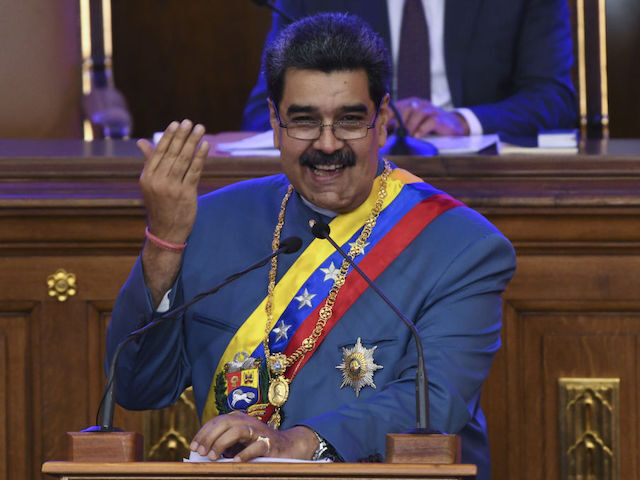
COMMENTS
Please let us know if you're having issues with commenting.